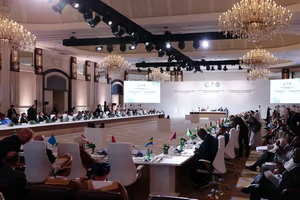Contacted for comment, neither the Ugandan nor Senegalese embassies immediately responded.
In a recording of his debriefing obtained and reviewed by Iran International, the Ugandan man said he was approached by a Pakistani national professing to belong to the Quds force.
The man, Zahid Jawad, instructed him to film the Israeli embassies in the two African countries and procure hand guns and grenades for a potential attack.
He added that an Iranian member of the Quds Force later contacted him on WhatsApp and offered payment in exchange for cooperation.
The Ugandan man said Quds Force members referred to him as “Rambo,” after the American action movie character.
Iran International has reviewed screenshots of some of the exchanges but cannot independently verify the authenticity of the communications.
Iran's mission to the United Nations did not immediately respond to a request for comment.
Tehran has in recent years been alleged by Western security agencies and media reports to have recruited petty criminals and gang members to carry out attacks on dissidents and Israeli interests.
A federal court in New York last month convicted two alleged mobsters of seeking to kill US-based Iranian dissident Masih Alinejad in a plot prosecutors said was orchestrated by the IRGC.
Quds Force Unit 840
The intelligence source told Iran International that three Iranian members of the alleged bid to recruit the man have been identified as Meysam Sahraei, Reza Ghabadi and Abbas Mohammad Naeim.
The source said all three work for Unit 840 of the IRGC’s Quds Force commanded by Yazdan Mir, known by the alias Sardar Bagheri, whom Western intelligence agencies believe is tasked with targeting dissidents as well as Israeli and American interests.
Tehran has consistently denied such accusations.
In one of the Whatsapp exchanges, the Iranian contact allegedly allegedly sent the Ugandan man an image of a grenade and instructed him to purchase a similar device.
The Ugandan national asserted that his contact consulted a supervisor and obtained approval of funds to be transferred to his account.
Iran International has not been able to independently verify whether any payments were made or surveillance was carried out.
'Proxy of a proxy'
The intelligence source described Iran's method of recruiting foreign nationals via other foreign nationals as a “proxy-of-a-proxy” model.
A similar pattern was seen three years ago in the Democratic Republic of Congo, according to the same source, when the Quds Force allegedly recruited a Congolese student then studying at Al-Mustafa International University in Qom to scout potential targets.
His handler, the source said, was Mehdi Hassan, a Pakistani member of the Zainabiyoun Brigade militia which operated in Syria during that country's civil war.
Hotspot Uganda
Separate information obtained by Iran International appears to show that the IRGC may also be using Uganda as a logistical waypoint for arms shipments to its regional allies.
The East African nation maintains warm relations with Israel, and during a visit five years ago, Israeli Prime Minister Benjamin Netanyahu asked the Ugandan president to consider opening an embassy in Jerusalem.
A source within Iran's Mahan Air told Iran International that the IRGC has been transporting weapons aboard a Boeing 747 aircraft registered with Fars Qeshm Air, using routes that pass through African countries en route to Yemen.
International flight registry data shows that on September 24, the aircraft flew from Bandar Abbas to Entebbe, Uganda.
According to the source, the plane first traveled from Tehran to Bandar Abbas to refuel due to the heavy cargo load. On October 28, the same aircraft reportedly made another delivery flight from Tehran to Uganda.
Data from Flightradar24 confirms that flights matching these routes took place, but flight-tracking information alone does not indicate cargo type or purpose.
The source said the Islamic Republic has sought new logistical corridors since the loss of its long-standing transit hub in Syria following the fall of Bashar al-Assad last year.
Iran International contacted ministries for security and internal affairs in Uganda and Senegal, but neither responded immediately.












